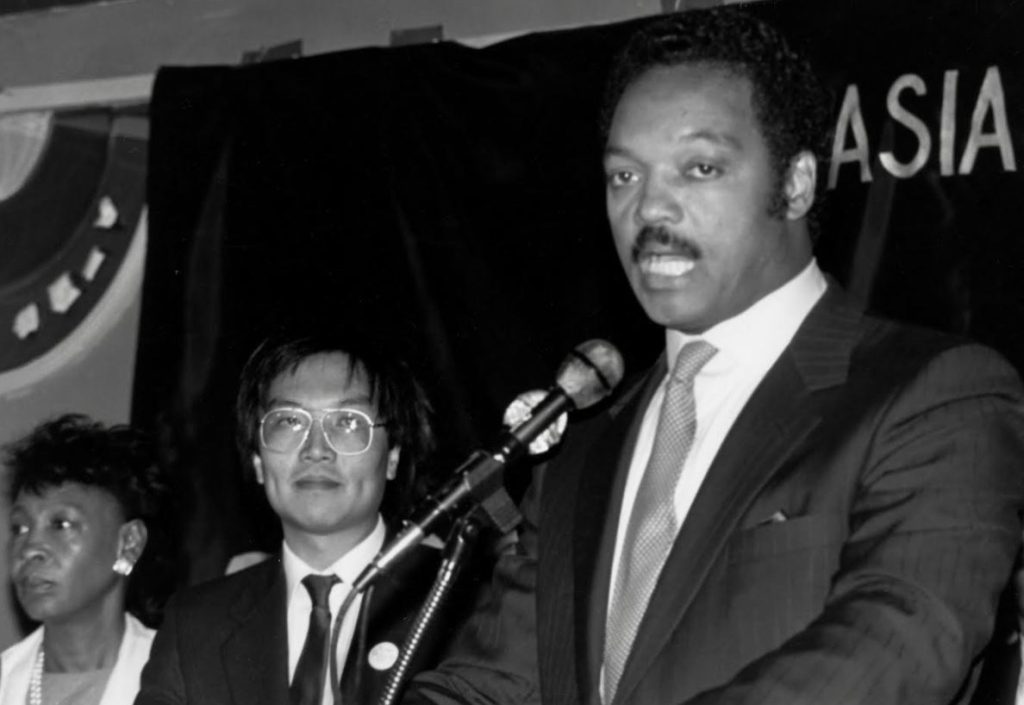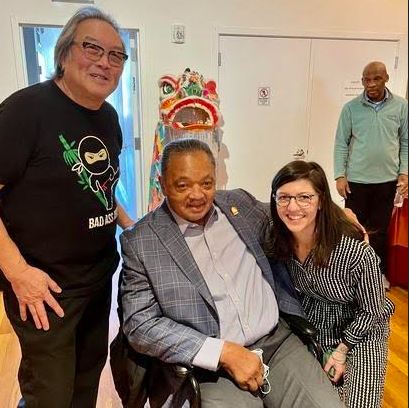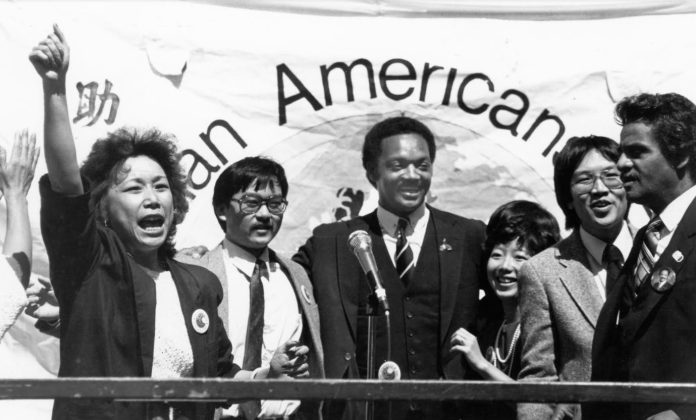By Helen Zia
Eddie Wong, filmmaker and activist, on his work Black civil rights leader Jesse Jackson
Eddie Wong grew up working in his parents’ Chinese laundry in Los Angeles—a tough way to make a living in America, but that was one of the few options available to Chinese immigrants from Taishan in those years when the US severely limited Chinese from entering the country. He was in his early 30s, when he spoke at a community meeting to organize the 1984 presidential campaign of the Rev. Jesse Jackson, who worked with Dr. Martin Luther King, Jr. in the Civil Rights Movement.
Wong was recruited to become the Northern California field coordinator for Rev. Jackson’s 1984 presidential campaign, and eventually became the National Field Director for his 1988 presidential bid. In the course of his duties, he often accompanied Rev. Jesse Jackson and met famous icons like Bishop Desmond Tutu, actor Eddie Murphy and singer Aretha Franklin, who actually cooked dinner for Rev. Jackson—and Eddie–in her home!
Author Helen Zia asked Eddie about his reflections as an Asian American on the inner circle of the presidential campaigns of the legendary Black leader
Q. How did a Chinese American like you connect to the message of Black civil rights leader like Jesse Jackson?
Eddie: When I was growing up in LA, I saw the frustrations and struggles of the Black community around me explode into the Watts community riots in 1965. I understood the feeling of being at the bottom of society—everyday, I saw how some people talked down to them and accused them of stealing their clothes—making it clear that people like my parents were beneath them. So I understood what the civil rights movement was about and I believed that Asian Americans needed to be part of it
Q. What was it like to be an Asian American working closely with a prominent leader of the Black civil rights movement?

Eddie: Sometimes people were shocked to see me with Rev. Jackson—I was the first Asian person that some people had ever met, especially in the smaller Southern towns. Not just seeing me, but Rev. Jackson also included Latinos, Arab Americans, and women in his leadership circle. Initially, some Black community folks said, hey, shouldn’t those positions go to Black people? But Rev. Jackson said, “No, we’re building a Rainbow Coalition”. Many around Operation PUSH in Chicago welcomed Asians, Latinos and others because they saw that we were building a bigger movement of solidarity.
Q. What did you learn, working so closely with the Black community?
I saw how Black women are the anchor of the Black community and they do everything that needs to get done, from running the Black church to a presidential campaign. Of course there are significant male leaders, but Black women make everything happen.
Q. How does the Black-Asian solidarity of the 1980s translate in today’s society?
Eddie: There are tensions but there has also been significant Asian American embrace of Black leadership, for example in the election of President Obama. But on the street level, there are tensions about safety and crime, for example with Asian American small businesses. People of all communities have the right to be safe and need to show the real solidarity of Black leaders supporting Chinatowns and Asian American activists standing with Black communities against police violence. We also have to show that the bigger picture of addressing crime has to address poverty and other social issues, and that will take solidarity, including with Asian Americans.
Q. Given your direct experience with presidential campaigns, what are your thoughts about this year’s race?
Eddie: On every issue that concerns Asian Americans, e.g., women’s rights, civil rights, and economic opportunity, Kamala Harris has policies that will lift up and include Asian Americans. Trump on the other hand, has demonstrated only disgust for Asian Americans and others through his words and actions. Meanwhile, Asian Americans are registering to vote at a much higher rate than any other group, and Harris/the Democrats will be the beneficiaries of Asian Americans’ rising expectations for political empowerment. Asian Americans for Democracy (AA4D) brings visibility Asian American voters who are providing the numerical margin of victory in the battleground states.
Q. Why are you supporting VP Harris?
Eddie: The choice between Harris and Trump is as clear as night and day, both in temperament and policies. Kamala Harris exudes empathy and compassion which comes from being raised as a biracial child by a single, immigrant mother in a working class neighborhood. Trump enjoys belittling people whether it is by racist taunts like mispronouncing names or mimicking disabled people. He is also a narcissist, bully and misogynist.
In terms of policies, Harris firmly advocates for improving the lives of working people via childcare relief, job creation, small business subsidies, affordable health care and expanded educational opportunities. Trump promises tax cuts for the rich and corporations, deportation of immigrants, and the evisceration of social service programs. We all know climate change is real, but under a new Trump administration fossil fuel will be king and drill baby drill will set us back just as we are beginning to make progress.

Q. Did working with Rev. Jackson influence my decision to support Kamala Harris?
Eddie: Definitely. Working with Rev. Jackson taught me that the battle for civil rights, which is a battle for human rights, is ongoing because in the richest nation on earth, people are still going to bed hungry or without a roof over their heads. The Civil Rights movement paved the way for gains in Black representation in politics and business. The Women’s movement broke down barriers that had long held women back. Kamala Harris is part of a generation of people of color who could enter politics, business, public service, the arts and sciences, and once there they could rise as far as their skills could take them. I see Kamala Harris as a joyful warrior continuing in the path that Dr. Martin Luther King, Jr. and Jesse Jackson blazed. She continues to build bridges across the racial and class divide just as President Obama sought to do. Her slogan, “We’re not going back, we’re going forward to a better future” captures the spirit of defiance against discrimination and optimism that we as a nation can resolve our differences and build the society in which everyone can thrive– which is the throughline to what Rev. Jackson and other Black civil rights leaders stood for and why I got involved in fighting for our AAPI communities when I was a young person helping my parents ‘ Chinese laundry in LA.
Eddie Wong is one of the cofounders of AsianAmericans4Democracy.org.
Helen Zia, who also works with AA4D, is the founder of the Vincent Chin Institute.
This coverage was made possible by a grant through the URL Collective, a nonprofit supporting local, diverse media. AsAmNews and URL Collective have partnered to bring you election reporting from grassroots media.
AsAmNews is published by the non-profit, Asian American Media Inc.
We are supported through donations and such charitable organizations as the Robert Wood Johnson Foundation. A big thank you to all our readers who supported our year-end giving campaign. You helped us not only reach our goal, you busted through it. Donations to Asian American Media Inc and AsAmNews are tax-deductible. It’s never too late to give.
Please also follow us on Instagram, TikTok, Facebook, YouTube and X.

